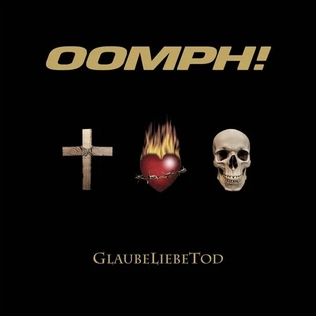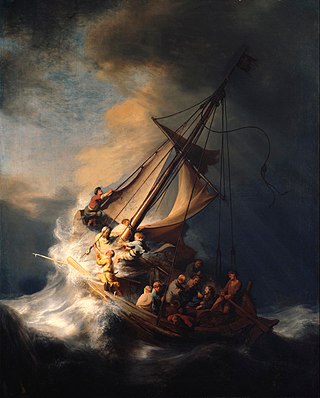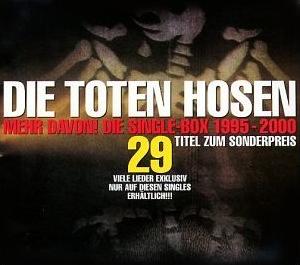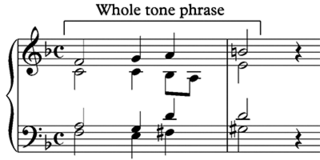
Ewigkeit is the musical project of English artist James Fogarty aka Mr. Fog from Brighton. Having released five studio albums, on 28 March 2007, Fogarty announced the end of the project on Blabbermouth, the Death To Music website and also on Myspace but revived it in 2012.
Gracia Arabella Baur is a German singer and songwriter. She rose to fame as a finalist on the debut season of the television series Deutschland sucht den Superstar, the German Idol series adaptation, placing fifth.

GlaubeLiebeTod ("FaithLoveDeath") is the ninth studio album by the German industrial metal band Oomph!. It was released in March 2006.
Thanatos is the Ancient Greek personification of death.
Alice In... is an indie industrial-oriented record label based in Hesse, Germany.
Relatives Menschsein is a German darkwave band formed in 1990 by the musicians Amadeus, Lissy Mödl and Jörg Wolfgram. They are one of the first "Neue Deutsche Todeskunst" bands. They were signed to label Danse Macabre, founded by the members of Das Ich.

Thanatos is an album of Relatives Menschsein collecting their output. It contains their previous albums Gefallene Engel and Die Ewigkeit.

Reich & sexy II: Die fetten Jahre, subtitled Ihre allergrössten Erfolge is Die Toten Hosen's second compilation album, named after the first one. It was released as a single- or double-CD, in a digipak. The cover is based on the cover of Reich & sexy.

Johann Sebastian Bach composed the church cantata O Ewigkeit, du Donnerwort, BWV 20, in Leipzig for the first Sunday after Trinity and first performed it on 11 June 1724. Bach composed it when beginning his second year as Thomaskantor in Leipzig. It is the first cantata he composed for his second annual cycle which was planned to contain chorale cantatas, each based on a Lutheran hymn. The cantata is focused on Johann Rist's 1642 hymn "O Ewigkeit, du Donnerwort", with a chorale melody by Johann Schop. As usual for Bach's chorale cantatas to come in the cycle, selected hymn stanzas were retained while the others were paraphrased by a contemporary poet who transformed their ideas into a sequence of alternating recitatives and arias. For this cantata, the first stanza was used unchanged, and two more stanzas to conclude the cantata's two parts. The first part was performed before the sermon, the second part after the sermon. The first part is in seven movements, and the second part is in four movements.

Jesus schläft, was soll ich hoffen?, BWV 81, is a church cantata by Johann Sebastian Bach. He composed it in 1724 in Leipzig for the fourth Sunday after Epiphany and first performed it on 30 January 1724.

"O Ewigkeit, du Donnerwort" is a Lutheran hymn in German, with text by Johann Rist, first published in Lüneburg in 1642. It was translated into English in several versions. The hymn was used in cantata music, including Bach's first chorale cantata of his second cantata cycle, BWV 20.

Opium fürs Volk is the seventh studio album by the German punk band Die Toten Hosen. Although it's not considered a concept album, it has a central theme of religion. It is regarded as one of the best Die Toten Hosen albums. The title is derived from a common misquotation of Karl Marx, who called religion the Opium of the People - Opium des Volkes.

Mehr davon! Die Single-Box 1995–2000 is a single box by the German punk band Die Toten Hosen. It contains some of the more important singles from 1995–2000, released in different variations with different singles. The 2005 release Mehr davon! Die Single-Box partly crosses over with this release and also has different variations.

"Nichts bleibt für die Ewigkeit" is a song by Die Toten Hosen. It's the first single and the sixth track from the album Opium fürs Volk.

O Ewigkeit, du Donnerwort, BWV 60, is a church cantata for the 24th Sunday after Trinity composed by Johann Sebastian Bach. It was first performed in Leipzig on 7 November 1723, and is part of Bach's first cantata cycle. It is one of Bach's dialogue cantatas: its topic, fear of death and hope of salvation, plays out mainly through a conversation between two allegorical figures, Fear and Hope.

The East Germany men's national handball team represented the former country of East Germany in international team handball competitions. They had eight appearances at the World Men's Handball Championships, where they won silver medals in 1970 and 1974, and bronze medals in 1978 and 1986. East Germany won Olympic gold in 1980 after a thrilling final against the USSR. The 1958 World Men's Handball Championship was the third team handball World Championship. It was held in the German Democratic Republic between 27 February and 8 March 1958.The 1974 World Men's Handball Championship was the eighth team handball World Championship. It was held in East Germany between 26 February-10 March 1974. On 30 July 1980, the team won the olympic tournament by defeating the Soviet Union, 23–22, in the final game in Moscow.
Neue Deutsche Todeskunst is a musical genre that developed in Germany in the late 1980s. It is credited with establishing the German language in the dark wave movement, although there were already such German bands as Xmal Deutschland, Geisterfahrer, and Malaria!.

Dionysian Dithyrambs, also called Dionysus-Dithyrambs, is a collection of nine poems written in second half of 1888 by Friedrich Nietzsche under the pen name of Dionysos.

The Kulturpalast Dresden is a modernist building built by Wolfgang Hänsch during the era of the German Democratic Republic. It was the largest multi-purpose hall in Dresden when it opened in 1969, and was used for concerts, dances, conferences and other events. The building underwent several years of reconstruction beginning in 2012 and opened with a new concert hall in April 2017.
"Morgenglanz der Ewigkeit" is a Christian hymn with German text originally by Christian Knorr von Rosenroth, written around 1690 and set to music for private devotion. It became known with a 1662 melody by Johann Rudolf Ahle. The song is part of modern German hymnals and songbooks. It was translated to English as "Come, Thou Bright and Morning Star", and as "Dayspring of Eternity".














